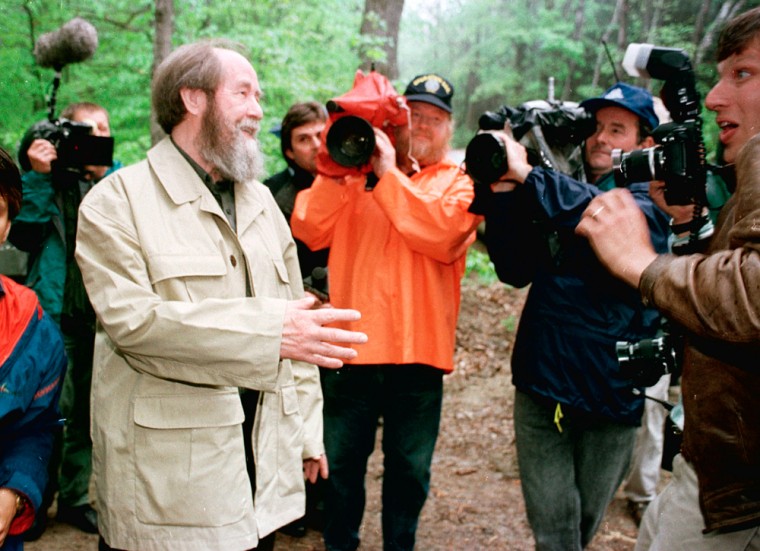When Alexander Solzhenitsyn sought refuge in the West, he looked for a place whose forested hillsides and harsh winters evoked his Russian homeland, and where residents had an ethic of respecting one another's privacy. The southern Vermont town of Cavendish was just the spot.
The famed writer, who died Sunday at age 89, became something of a local curiosity and a prized resident whose movements and even the location of his home were closely guarded secrets. He also became, for a time, a source of some annoyance to local hunters and snowmobilers after he built a gated fence around his 51-acre property.
That issue was dispelled on Town Meeting Day in 1977, the annual state holiday when residents gather in school gyms and town halls to debate local budget items. At the Cavendish meeting that year, Solzhenitsyn apologized through an interpreter.
Dr. Gene Bont, a now retired physician who cared for the Solzhenitsyns — mainly the writer's three sons — said Solzhenitsyn told residents he needed privacy to accomplish his work.
Solzhenitsyn added: "'I know you have a great deal of freedom to hunt,'" the doctor recalled. "He said that one of the reasons he needed to fence off his property was that when he was living in Switzerland" — after first leaving Russia in 1974 — "he was interrupted so much he couldn't get any work done."
Cavendish, with roughly 1,500 residents, seemed to appreciate the explanation, said Town Manager Richard Svec. They became protective of Solzhenitsyn's privacy during his 18 years there.
"He'd always been a fairly enigmatic person, and him making a public appearance to the local townspeople, that went a long way with the folks in town," Svec said.
False directions
Bont added, "When the news media found out he was in Cavendish they just descended on the town to find out everything they could. People wouldn't tell them anything," and would even give reporters and television crews false directions when asked how to find the writer's house.
Solzhenitsyn turned down nearly all requests for interviews, telling The Associated Press in a brief letter in 1990 that things were changing so fast as the Soviet Union dissolved that any comment he could make would be outdated in a very short time.
He had made an exception a decade earlier with Vermont Life magazine, inviting a writer into his home and revealing a tight-knit and warm family devoted to supporting the author's work.
Bont recalled that when he'd make an occasional late-night visit to the home to see one of the children who had taken ill, the light would be on in the outbuilding adjacent to the main house where Solzhenitsyn worked. "No matter how late it was he seemed to be working," the doctor recalled.
Solzhenitsyn traveled occasionally during his time in Vermont, appearing in world capitals and delivering the commencement address at Harvard in 1978, scolding the West for laziness, materialism and godlessness. He occasionally played host to Russian dignitaries, including fellow dissident Aleksandr Ginzburg and cellist Mstislav Rostropovich.
He made rare appearances in town as well, in one instance turning up and offering brief remarks at a local parade marking the bicentennial of Vermont statehood in 1991.
Finally, in 1994, just before he and his family moved back to Russia, Solzhenitsyn spoke at the Town Meeting again, said Svec, who will play the writer giving that final address in a theatrical production devoted to local history later this month.
‘Could not imagine a better place’
"Our children grew up and went to school here, alongside your children," Solzhenitsyn told his neighbors, as interpreted by his son Stepan. "Indeed, our whole family has felt at home among you. Exile is always difficult, and yet I could not imagine a better place to live, and wait, and wait for my return home, than Cavendish, Vermont."
